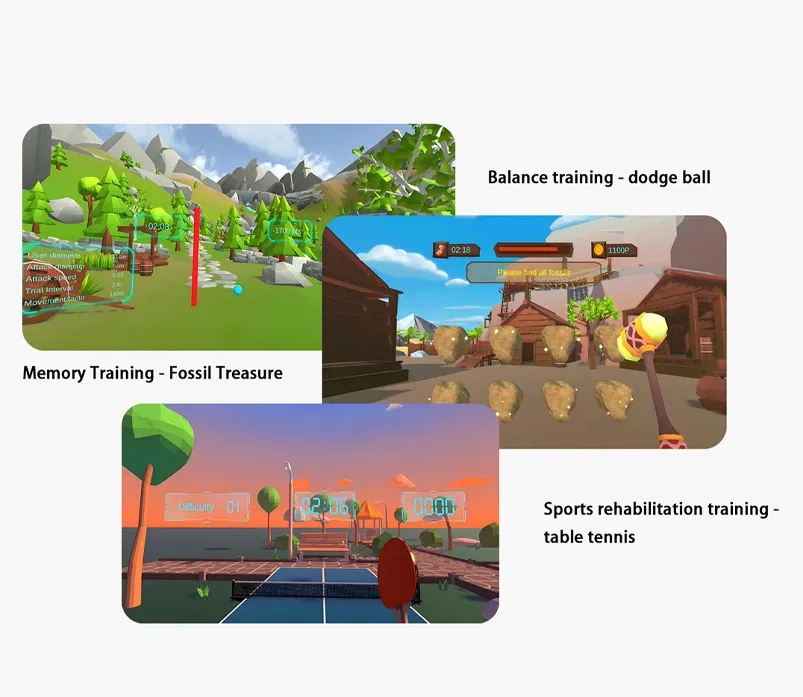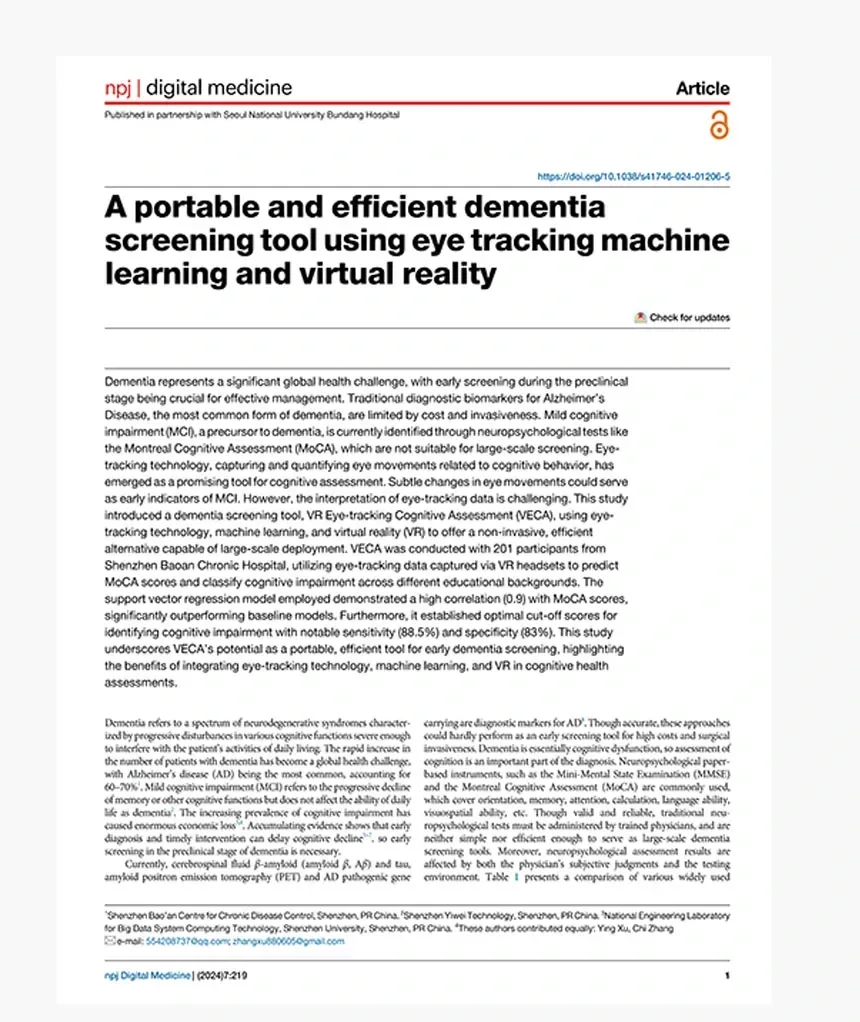
Growing analyses suggests that cyber environments approach can dramatically augment the experiences of clients experiencing cognitive decline. By placing them to tranquil settings, VR creates a innovative opportunity for mind energizing, psychological balance, and social interaction. Several analyses have established that VR therapy can lessen anxiety states, apprehension, and despondency in dementia users while also elevating their recollection, awareness, and dialogue proficiency.
- VR facilitates persons with dementia to retrace cherished memories through dynamic representations.
- Furthermore, it can yield a harmless and nurturing space for social contact, enhancing a realization of relationship and affiliation.
- Professionals propose that VR therapy has the prospect to revolutionize dementia treatment by providing new and groundbreaking approaches to confront the complicated challenges faced by clients suffering from this disease.
Innovative Tech Treatments for Alzheimer's
Emerging technological strategies are gaining recognition in the province of mental improvement for patients living with Alzheimer's dementia. These applications harness digital innovation to strengthen brain performance and theoretically impede the progression of the illness. Playful routines, personalized mentoring, and neuropsychological training are some representations of plans being analyzed in this evolving sphere. While experiments are advancing, digital therapeutics afford a potential means for improving the conditions of those managing Alzheimer's disorder.Navigating Reality Through Virtual Landscapes: A Novel Approach to Alzheimer's Treatment
Regarding persons dealing with Alzheimer's disease, the continuous diminution of remembrance and psychological faculties can notably influence their facility to participate with the environmental sphere. This harmful disorder often leads in detachment, distress, and a lowered self-perception. Recent progresses in virtual reality technology introduce a state-of-the-art chance to address these concerns by building immersive scenarios that can stimulate the brain and revive cognitive function.
Artificial reality spaces designed specifically for patients diagnosed with Alzheimer's can move them in familiar venues, such as their youthful dwelling or a treasured public park, reminiscing positive memories and easing anxiety. Through interactive practices, these virtual worlds can also enhance cognitive abilities like cognition, mindfulness, and critical thinking.
The likely improvements of virtual reality in Alzheimer's support are vast. Early analyses have revealed positive results, with users experiencing improvements in cognitive skills, mood, and overall quality of life. As this technique evolves, it holds the key to revolutionizing the way we approach Alzheimer's disease, providing a new pathway for help and strengthening.
VR Reminiscence Therapy for Alzheimer's Patients
Reminiscence therapy is a widely recognized technique used to augment cognitive function and affective health in individuals with Alzheimer's disease. This established form of therapy involves eliciting patients to relate past experiences, often through dialogue. However, a cutting-edge approach is emerging: VR-mediated reminiscence therapy.
This immersive solution utilizes virtual reality headsets to transfer patients in realistic environments that bring forth memories from their past. By experiencing these virtual scenes, individuals with Alzheimer's can participate with their past in a meaningful way.
Harnessing VR to Improve Cognitive Abilities in Dementia
Virtual reality (VR) is emerging as a aspiring technology in the fight against dementia, presenting state-of-the-art ways to enhance memory and cognition. By forming immersive simulations, VR can help individuals with dementia retrieve memories, join in meaningful activities, and elevate cognitive functions. Studies have confirmed that VR interventions can effect considerable improvements in memory recall, attention, and geographical awareness. Moreover, VR provides a reliable and motivating space for individuals with dementia to express, reducing feelings of isolation and nervousness.
- What's more, VR can be adjusted to individual needs and preferences, supporting increased levels of engagement.
- Notwithstanding the opportunities of VR, continued research is needed to fully understand its long-term efficacy in dementia care.
Rekindling Memories, Rebuilding Connections: VR's Impact on Social Engagement in Alzheimer's Disease
Computer-generated immersive environments is emerging as a advanced platform in the sphere of dementia care. By building engaging and responsive environments, VR has the potential to renew memories, encourage social interaction, and increase the overall quality of life for subjects struggling with Alzheimer's. Among the most influential aspects of VR is its ability to transport users to vintage venues and encounters from their past. Whether it's a jaunt inside a childhood home or a depiction of a beloved holiday, these virtual travels can trigger happy memories and solidify cognitive operation. Furthermore, VR can enable social interaction by uniting individuals with others who share similar preferences. This can be particularly helpful for people with Alzheimer's who may face difficulties with traditional social mixing. By offering a safe and compelling virtual space, VR can lessen feelings of isolation and loneliness, which are common among subjects affected by Alzheimer's. Overall, VR holds immense likelihood for revolutionizing the lives of users with Alzheimer's by rekindling memories, repairing connections, and advancing their quality of life. As technology keeps on advance, we can expect even more groundbreaking applications of VR in the field of dementia care.Exploiting Cognitive Training: Implementing VR Techniques for Alzheimer's Aid
Simulated immersive settings is rapidly emerging as a cutting-edge tool in the realm of cognitive training, particularly for persons living with Alzheimer's disease. By immersing patients in interactive and engaging virtual environments, VR-based interventions can activate cognitive functions such as memory, attention, and problem-solving. These games routinely incorporate elements of storytelling, exploration, and social interaction, making the training process significantly appealing. Studies have shown that VR-based cognitive training can lead to considerable improvements in cognitive performance, likely delaying the progression of Alzheimer's symptoms. Moreover, VR provides a safe and controlled environment for patients to practice new skills and grow their confidence.
- Gamification in VR training can make it significantly captivating and exciting for users with cognitive difficulties.
- VR simulations can offer realistic scenarios that test and activate cognitive functions.
- Personalized VR experiences can cater to specific requirements and preferences.
Exploring VR's Advantages in Dementia Support
Mesmerizing computer-generated settings offer a novel and positive avenue for individuals living with dementia. These tools can emulate familiar environments, allowing those affected by cognitive decline to revisit cherished memories and enhance a sense of familiarity. By combating the symptoms of dementia, VR platforms have the capacity to enhance quality of life for both patients and their families.
- Investigations indicate that VR methods can effectively impact cognitive function, affective well-being, and even kinetic abilities in individuals with dementia.
- Moreover, VR furnishes a safe and controlled environment for interaction, reducing the risk of danger.
- What is more, VR can encourage social relationships by allowing individuals with dementia to participate in simulated activities with others.
Innovative VR for Alzheimer's Early Recognition and Therapy
Alzheimer syndrome presents a complicated barrier, often going undetected in its early stages. Yet, virtual reality (VR) is becoming prominent as a cutting-edge tool for initial identification. Through immersive environments, VR can monitor cognitive abilities in ways that traditional methods cannot cope to. This possibility allows for immediate action strategies, potentially pausing disease progression and elevating the quality of life for people with Alzheimer's.
- VR-based assessments can test memory, attention, and spatial awareness in a safe and controlled setting.
- Bespoke VR applications facilitate interactive mental activity for patients.
- Computer-generated spaces provide social conditions for Alzheimer's clients to bond and mingle.
Facilitating Dementia Communication and Interaction Through VR
{In the realm of dementia care, innovative technologies are emerging to boost the lives of people affected by dementia. Virtual reality (VR) is one such innovation that holds immense opportunity for closing social and communicative divides common in dementia patients. By providing enthralling virtual settings, VR can enhance cognitive function, reduce behavioral issues, and ultimately improve the overall well-being of participants handling dementia.
VR experiences focused on dementia patient engagement can range from recollection therapy sessions that transport users back to familiar places and times, to interactive games that promote social interaction and cognitive development. Furthermore, VR has the skill to connect participants in dementia care with associates, regardless of physical limitations, fostering a sense of belonging.
- VR can support in reducing agitation and anxiety by providing a calming and engrossing environment.
- Evaluations have shown that VR interventions can lead to improvements in cognitive function, mood, and social interaction in clients experiencing cognitive decline.
- As technology evolves in evolve, we can expect even more innovative and {effective|beneficial|helpful|powerful|impactful|successful|productive|efficient cognitive function reheablation
